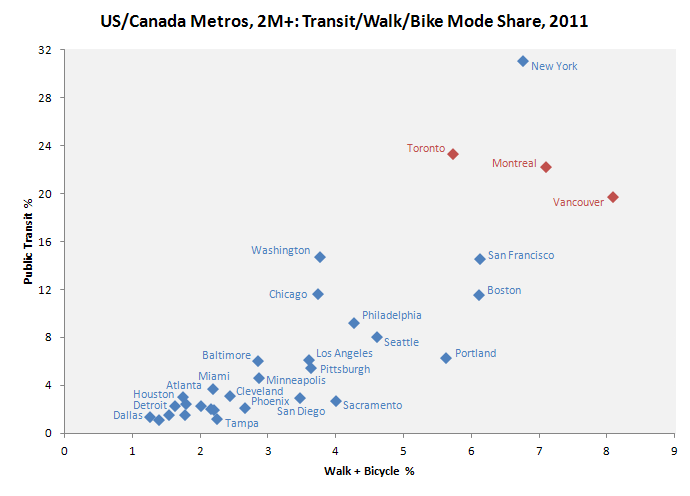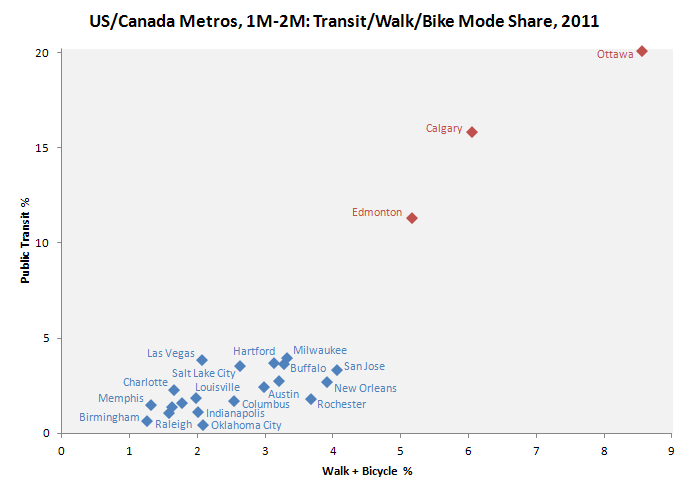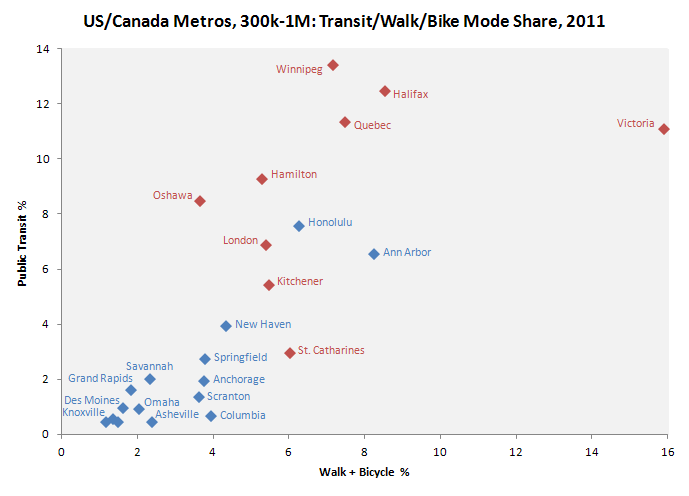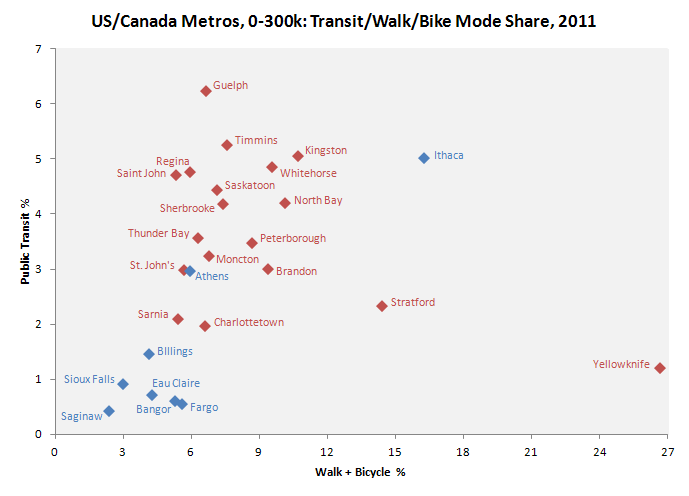| |
 Posted Sep 5, 2018, 8:14 AM
Posted Sep 5, 2018, 8:14 AM
|
 |
Registered User
|
|
Join Date: Apr 2004
Posts: 4,746
|
|
Transit and walking/cycling mode share of Canadian metropolitan areas in 2011:
Code:
Metro Area Population %Transit %Active
Toronto 5,584,064 23.28 5.72
Montreal 3,934,078 22.24 7.09
Vancouver 2,313,328 19.71 8.08
Ottawa 1,236,324 20.10 8.55
Calgary 1,214,839 15.87 6.04
Edmonton 1,159,869 11.32 5.16
Quebec 767,310 11.34 7.46
Winnipeg 730,018 13.41 7.14
Hamilton 721,053 9.27 5.28
Kitchener 496,383 5.43 5.46
London 474,786 6.89 5.39
St. Catharines 392,184 2.94 6.00
Halifax 390,328 12.47 8.52
Oshawa 356,177 8.45 3.63
Victoria 344,177 11.08 15.89
Saskatoon 262,215 4.45 7.09
Regina 211,519 4.77 5.90
Sherbrooke 202,261 4.19 7.38
St. John's 196,954 2.98 5.66
Kingston 159,561 5.06 10.69
Guelph 141,097 6.24 6.63
Moncton 139,287 3.25 6.73
Saint John 129,057 4.72 5.30
Thunder Bay 121,596 3.58 6.27
Peterborough 118,975 3.48 8.63
Sarnia 97,131 2.10 5.38
North Bay 72,241 4.21 10.11
Charlottetown 65,523 1.98 6.56
Brandon 58,003 3.01 9.35
Timmins 41,788 5.26 7.55
Stratford 30,903 2.33 14.36
Whitehorse 26,028 4.86 9.52
Yellowknife 19,028 1.21 26.61
Transit and walking/cycling mode share of US metropolitan areas in 2011:
Code:
Metro Area Population %Transit %Active
New York 19,015,900 31.11 6.76
Los Angeles 12,944,801 6.23 3.60
Chicago 9,504,753 11.69 3.74
Dallas 6,526,548 1.44 1.26
Houston 6,086,536 2.34 1.62
Philadelphia 5,992,414 9.28 4.27
Washington 5,703,948 14.79 3.77
Miami 5,670,125 3.81 2.18
Atlanta 5,268,860 3.08 1.74
Boston 4,552,402 11.62 6.11
San Francisco 4,391,037 14.58 6.13
Riverside 4,304,994 1.59 1.78
Detroit 4,285,832 1.63 1.54
Phoenix 4,263,236 2.16 2.66
Seattle 3,500,026 8.13 4.61
Minneapolis 3,318,486 4.69 2.87
San Diego 3,140,069 3.03 3.47
Tampa 2,824,724 1.24 2.25
St. Louis 2,817,355 2.40 2.01
Baltimore 2,729,110 6.12 2.85
Pittsburgh 2,359,746 5.55 3.63
Portland 2,262,605 6.33 5.63
San Antonio 2,194,927 2.14 2.16
Sacramento 2,176,235 2.73 4.00
Orlando 2,171,360 2.51 1.79
Cincinnati 2,138,038 2.05 2.20
Cleveland 2,068,283 3.22 2.44
Kansas City 2,052,676 1.20 1.40
Las Vegas 1,969,975 3.91 2.07
San Jose 1,865,450 3.37 4.06
Columbus 1,858,464 1.75 2.54
Charlotte 1,795,472 2.33 1.64
Austin 1,783,519 2.47 2.98
Indianapolis 1,778,568 1.18 2.01
Nashville 1,617,142 1.40 1.61
Providence 1,600,224 2.79 3.20
Milwaukee 1,562,216 4.00 3.31
Memphis 1,325,605 1.56 1.31
Louisville 1,294,849 1.92 1.98
Oklahoma City 1,278,053 0.49 2.08
Richmond 1,269,380 1.64 1.76
Hartford 1,213,255 3.74 3.12
New Orleans 1,191,089 2.74 3.90
Raleigh 1,163,515 1.09 1.58
Salt Lake City 1,145,905 3.59 2.63
Buffalo 1,134,039 3.68 3.27
Birmingham 1,132,264 0.67 1.25
Rochester 1,055,278 1.85 3.67
Honolulu 964,607 7.57 6.26
Tulsa 946,962 0.47 1.47
Omaha 877,110 0.91 2.03
New Haven 861,113 3.94 4.31
Grand Rapids 779,604 1.61 1.82
Columbia 777,116 0.66 3.92
Little Rock 709,901 0.56 1.33
Knoxville 704,500 0.44 1.15
Springfield 693,204 2.74 3.75
Des Moines 580,255 0.95 1.60
Scranton 563,223 1.37 3.60
Asheville 429,017 0.44 2.37
Anchorage 387,516 1.93 3.74
Savannah 355,576 2.02 2.31
Ann Arbor 347,962 6.54 8.22
Sioux Falls 232,433 0.93 3.00
Fargo 212,171 0.56 5.60
Saginaw 199,088 0.43 2.38
Athens 193,317 2.97 5.95
Eau Claire 161,151 0.73 4.28
Billings 160,097 1.47 4.15
Bangor 153,786 0.62 5.27
Ithaca 101,723 5.02 16.28
The numbers confirm that differences in transit usage in Canada are based heavily on the metropolitan area size. Therefore, metropolitan areas should only be compared their peers of similar size.




People in Canada are approximately 3 or 4 times more likely to use transit compared to people in similar sized metropolitan areas in the US. Canadians are also approximately 2 times more likely to walk or bicycle which suggests differences in the built environment. The graphs show some positive correlation between transit usage and walking/cycling. So getting people onto transit might not just be about providing more service but it might also require encouraging people to be more active as well.
Last edited by Doady; Sep 5, 2018 at 5:33 PM.
Reason: added Ottawa
|
|
|



